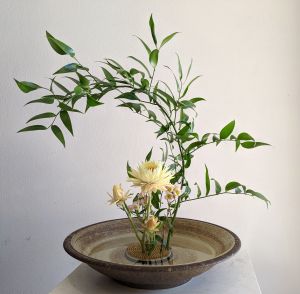Difference between revisions of "Flower-Arrangement"
Jump to navigation
Jump to search
| Line 1: | Line 1: | ||
| − | + | [[File:1 EVDoF37CfggPKnKY9jylQQ.jpg|thumb]] | |
Latest revision as of 06:32, 13 December 2020
Flower-Arrangement ; In Japanese, Ikebana As great lovers of nature, the Japanese try to create miniature editions, as in their gardens, built of stones, trees and water; or stunted trees in small containers, and in flower arrangement so stylized that each symbolizes a message, frequently a Bst. message. Ikebana,
like Cha-no-yu (q.v.) was born in the Silver Pavilion (q.v.) near Kyoto built in fifteenth century.
Leading exponent in England, Miss Stella Coe, a qualified master of the art.
See Gustie Herrigel, Zen in the Art of Flower Arrangement (1958).
